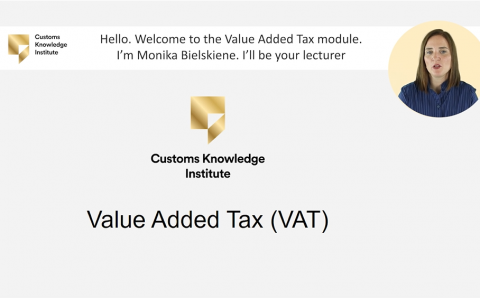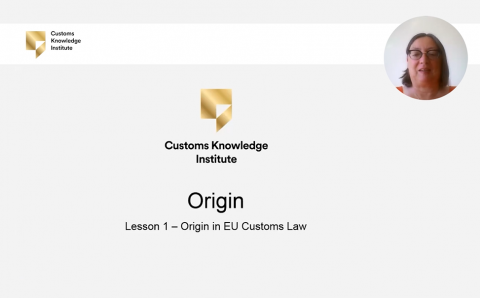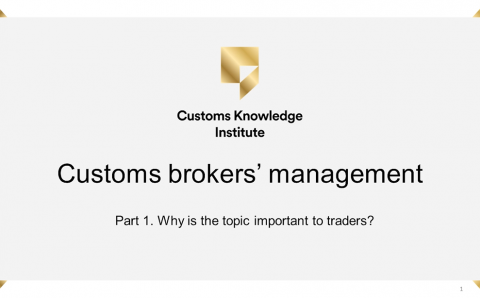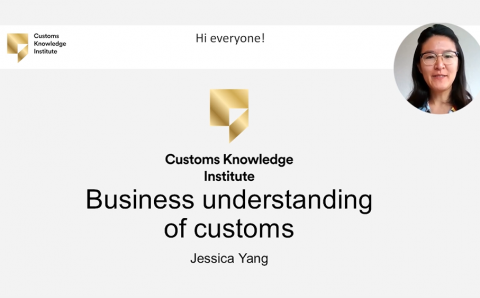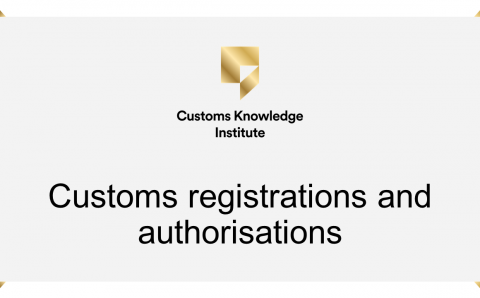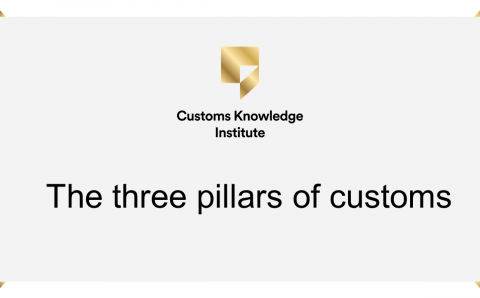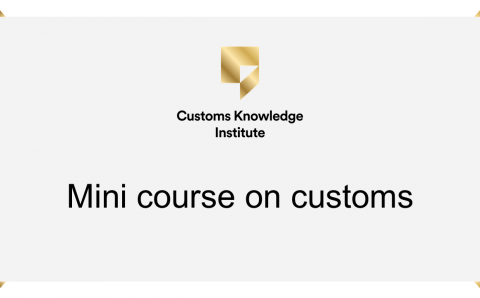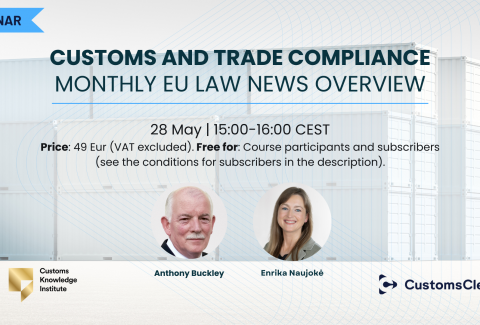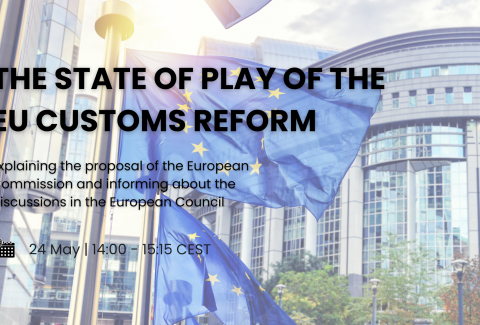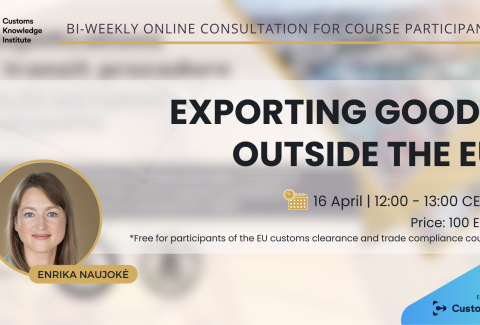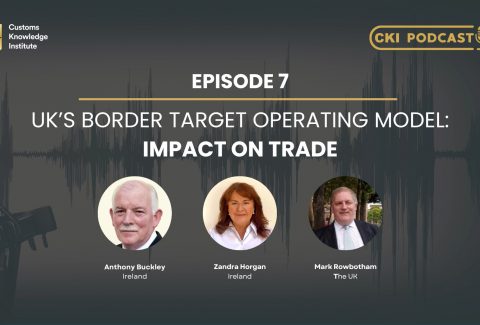The process of acquiring customs competence
2021-10-01 2022-08-16 13:15The process of acquiring customs competence

The process of acquiring customs competence

Anthony Buckley
CEO, Anthony Buckley Consulting Ltd.
In the article “Acquiring customs competence: What is the process?”, published in Customs Compliance & Risk Management journal, Anthony Buckley raises an important topic of how Brexit affected the understanding of what it takes to get required customs competence. Read an excerpt from the article below.
The removal of the World’s 5th largest economy (the UK) from the EU Single Market faced all European countries with an unprecedented challenge – to rapidly develop business understanding and expert competence in customs, trade, and international regulation – in an environment where the progressive liberalization of trade had effectively depleted customs expertise over a period of 50 years.
Brexit also presents us with a unique opportunity to address some key questions in training:
- With an immensely complex and ever-changing topic like customs, how should training be structured – what is the key framework, theory, or experience?
- Is an apprenticeship essential?
- What levels of knowledge are needed for the entrepreneur, the manager, the advisor, the declarant, the broker?
When the UK voted to leave the EU, the authorities in all of the “front-line” countries dealing most heavily with the UK (and of course in the UK itself) began the process of restoring customs expertise, modeling what the likely impacts would be, scaling up their customs systems and capacity, and preparing their business communities for the change. The questions flowing from the business were of course colored by the (very loud!) political debate, and generally were:
- What are customs?
- How will it affect my business?
- How can I continue as if nothing changes?
- Surely, we can find an easy/cheap way of “doing customs”?
- Surely Brexit won’t really happen?
The most effective approach, directed mainly at the owners and managers of trading businesses, proved to be to start at the very beginning, defining why customs exist, the reasons why international trade can not happen without it, and some key customs concepts – clearance before entry, proof of status, the accuracy of declarations and records.
As the sobering reality began to be appreciated, practical problems were raised, for example, how does one work a fast turnaround on Ro-Ro ferries with customs checking? What proportion of consignments needs to be checked? What is a “consignment” and what documents does it need? Can declarations be done by the business or do I need an agent?
These questions took the briefing/training a level deeper, into an exploration of possible courses of action for individual business sectors. It is to the great credit of all the countries involved in traffic across the English Channel and the Irish Sea that solutions were found to enable that traffic to continue, albeit with additional documentary and declaration requirements.
It emerged in this phase (2019) that there was a very serious shortage of customs agents and advisers. The conventional wisdom was (is?) that it takes three to five years to train a customs agent, and clearly, that time was not available. In desperation, short courses were developed that focused on the completion of customs declarations and sought to train people in as little as two weeks. Additionally, employment of trainee declarants was subsidized, and customs authorizations, including AEO, were speeded up and the requirement for full customs competency was treated flexibly.
Throughout 2020, the pace of training accelerated. It was hampered significantly by Covid and the consequent impossibility of classroom delivery. For businesses, the challenges of Covid diverted their attention from the looming issues of Brexit, and many took the view that the Governments would “sort it out”, with the result that the take-up of training and advice was disappointingly low.
At the same time, 2020 made the use of online training widespread for the first time. In Ireland, a very ambitious State-funded program gave introductory training to those who would be completing declarations. By using online training and a specially developed APP, they were able to handle classes of 50 at a time and ran 50 courses in the second half of the year.
Most businesses registered and obtained EORI numbers, but very few successfully prepared their supply chains. They did not understand the need to adjust Incoterms (terms of trade), or to conclude commercial contracts with suppliers and customers. Only a minority considered the possibility of establishing in the other customs territory. Overall, business adopted a minimalist approach to preparation, deferring serious decision making, with the dual justifications of Covid and political uncertainty.
January 2021 brought a new reality for EU traders. The UK decision to defer implementation of most customs procedures delayed the full impact there and unfortunately led to a continuation of the fiction that customs was somehow an invention of the EU. As a result, many UK businesses continued to resist changing their pre-Brexit procedures and many are still struggling with the fact that pre-Brexit procedures are no longer appropriate. For example, some still wish to issue UK invoices for goods moving within the EU and some resist issuing a commercial invoice for each consignment. Overall, businesses in the EU and the UK have adapted rapidly to the new realities and many have been very creative in finding new ways of doing business. Clearly, however, the process was hampered and made more difficult by a general lack of understanding, and by a shortage of expert advice.
The difficulties of early 2021 brought express carriers into a very prominent role. They have provided a vital bridge for many businesses, using their special authorizations to continue the movement of shipments, especially to smaller companies. Undoubtedly, they experienced many difficulties themselves as they adapted their systems to deal with new complexities, but they did very well overall, stepping in to fill a gap that could not be dealt with by traditional customs brokers and freight forwarders. For many, the express carriers bought time in which a longer-term solution can be planned. For regulated goods, however, they were less successful, and the burden of dealing with non-customs regulation fell heavily on traditional customs brokers and freight forwarders.
Customs brokers, agents and advisers continue to experience more demand than they can easily handle, and businesses find it really difficult to find representatives that can deal with their practical circumstances in a suitable way, and at an affordable cost. This is especially true for regulated goods, where companies previously managed compliance in-house, and now need to connect those systems with customs systems and with matching systems in the importing Territory. Looking forward, it is clear that the need for the development of customs expertise will continue for some time, within trading businesses and also in customs brokerages.
What are the lessons about customs knowledge?
The process has exposed a widespread lack of understanding about the “nuts & bolts” of international trade. The comfort provided by the Single Market clearly led to a situation where, even in large businesses, management concerned itself very little with trading terms, commercial procedures, and customs regulations. Brexit has shown us that it is very desirable for businesses to understand exactly how their procurement and sales processes work; what the cost of each component is; what the risks are, both compliance and commercial; and what the alternatives are.
For customs professionals, it is clear that many developed a familiarity over many years, with stable systems, and often in a narrow field of operation. This has been encouraged by the traditional profile of international trade in Europe, where a relatively small group of very large traders accounted for the great bulk of exports and imports. Such service providers have a limited ability to quickly adapt to new challenges, with a huge number of smaller and occasional traders, and a much wider range of traded goods, many of them subject to complex non-customs regulation. One of the strong messages to emerge from the Brexit experience is the need for customs professionals to take a wider view, incorporating non-customs regulation of trade, and an awareness of the importance of trading terms and arrangements.
In summary, one must conclude that Customs should be included as a central topic in any courses on international trade, logistics, or business development.
What are the lessons for customs training?
It is certainly possible to train a person to complete a customs declaration within a couple of weeks. This helps when there is a small number of items to be consigned, and there is little change week-to-week.
Training someone to be a customs broker, who can take any consignment and handle any customs procedure, certainly takes much longer – perhaps a year or more – and requires experience to support the theoretical training.
For a customs professional, experience is not enough. The ability to understand the law (national and international) is vital, and knowledge must be kept up to date. The theoretical framework must be matched also with a knowledge of current developments and experience of the actual activities of traders and administrations. This is an area for lifelong learning based on a sound theoretical understanding. As one professional told the author recently “In 30 years I have never had a day that was the same as any previous day”.
For business entrepreneurs and managers, a period of study is required, beginning with a general understanding, and then applying it to real-life problems and models. The level of technical knowledge need not be very high, and it is not necessary to be fully up to date with developments, but it is vital that one is able to ask the right questions when a proposal is made or a contract is being negotiated. Understanding how the systems work and interrelate is the key.
A huge lesson for customs training is that it can be done remotely. Since the beginning of 2020, we are forced to use online training. We have seen that this makes training accessible to busy senior managers and to junior recruits equally. The cost of training has fallen – no travelling, no absence from the workplace.
Online training also increases the involvement of the student. All of the information required is now available on the internet, mainly on Government and official websites. The online training includes referring students to source material that they must access themselves, developing their familiarity with finding answers and solutions, rather than relying on a trainer.
Online training enables the employment of a much wider range of expertise. In Ireland, Chartered Accountants Ireland developed a Certificate course that uses trainers from Ireland, the UK, Lithuania and France to co-deliver live training sessions. The richness of this approach would simply be impossible to achieve in a face-to-face environment.
The lack of engagement experienced in the pre-Brexit period shows the importance of actively engaging the participants. Recorded material is generally less effective than live delivery – webinars and recorded courses suffer from the inability of students to participate meaningfully. Similarly, a series of lectures, separate from each other, will be unlikely to retain attention. The phrase “death by PowerPoint” summarises the attitude of many to such days.
For the most effective engagement, the training session should ideally –
- Be interactive, with live questions;
- Involve more than one presenter;
- Have clearly stated messages, reiterated through linked presentations and drawn together at the end;
- Be extensively supported with recommended reading material (online); and
- Have a task, test or poll to ensure the participants have comprehended and internalised the key messages.
The ideal characteristics of a training session must however be balanced by feedback from students who report the value of recorded sessions –
- Ability to review several times;
- Do the tests many times;
- Go back and repeat modules in light of learning from later modules; and
- Re-check certain points to enhance understanding.
Overall, a blend of recorded presentations and live delivery is indicated, with recordings containing both required lectures and additional illustrative material, and live delivery in “tutorial” or “drop-in” discussion sessions.
Going Forward
A number of us – professionals involved in training – are setting up a Customs Knowledge Institute (CKI) to give effect to the lessons we have learned, and our belief that customs knowledge needs collaborative development. The CKI website is available at https://www.customsknowledgeinstitute.org/ Expressions of interest are most welcome from anyone who would like to join the knowledge network, or become involved in training.
We already have a network of interested customs practitioners from many EU countries, and we plan to develop this knowledge-sharing network as a forum for discussing issues and developing excellent customs training.
We are a not-for-profit training organisation, operating on the template of the EU customs competency framework to deliver online training. Our philosophy is that customs training requires a sound theoretical grounding – an understanding of concepts, legal and operational structures, sources of information, and official and business practices – based on which the student can develop her knowledge on the path most suitable to her needs and interests. Experience may come before or after the theory, but is essential to reaching the highest levels of competence.
Our first offering is a short 8-hour Mini course on customs introducing several key topics. In January 2022, we will offer a much wider course of some 80 hours over a three-month learning period, which we believe will equip people to become fully operational in the world of customs. Of course, no training course can fully equip a professional, and our vision is that the knowledge network will continuously support and assist those who complete our courses, as they proceed to maturity in the industry.
Related Posts
Proving preferential origin in EU and UK | Podcast, Episode 8
Online consultation: Customs formalities when importing goods into the EU
Customs and Trade Compliance | Monthly EU law news overview: June 2024
Online consultation: Release for free circulation in the EU
Monthly EU law news overview: May 2024
The State of Play of the EU Customs Reform
CKI and CONFIAD forge partnership with Memorandum of Cooperation
Customs and Trade Compliance | Monthly EU law news overview: April 2024
Online consultation: Exporting goods outside the EU
UK’s Border Target Operating Model: Impact on trade – Podcast, Episode 7
Search
Recent News
- Proving preferential origin in EU and UK | Podcast, Episode 8
- Online consultation: Customs formalities when importing goods into the EU
- Customs and Trade Compliance | Monthly EU law news overview: June 2024
- Online consultation: Release for free circulation in the EU
- Monthly EU law news overview: May 2024

